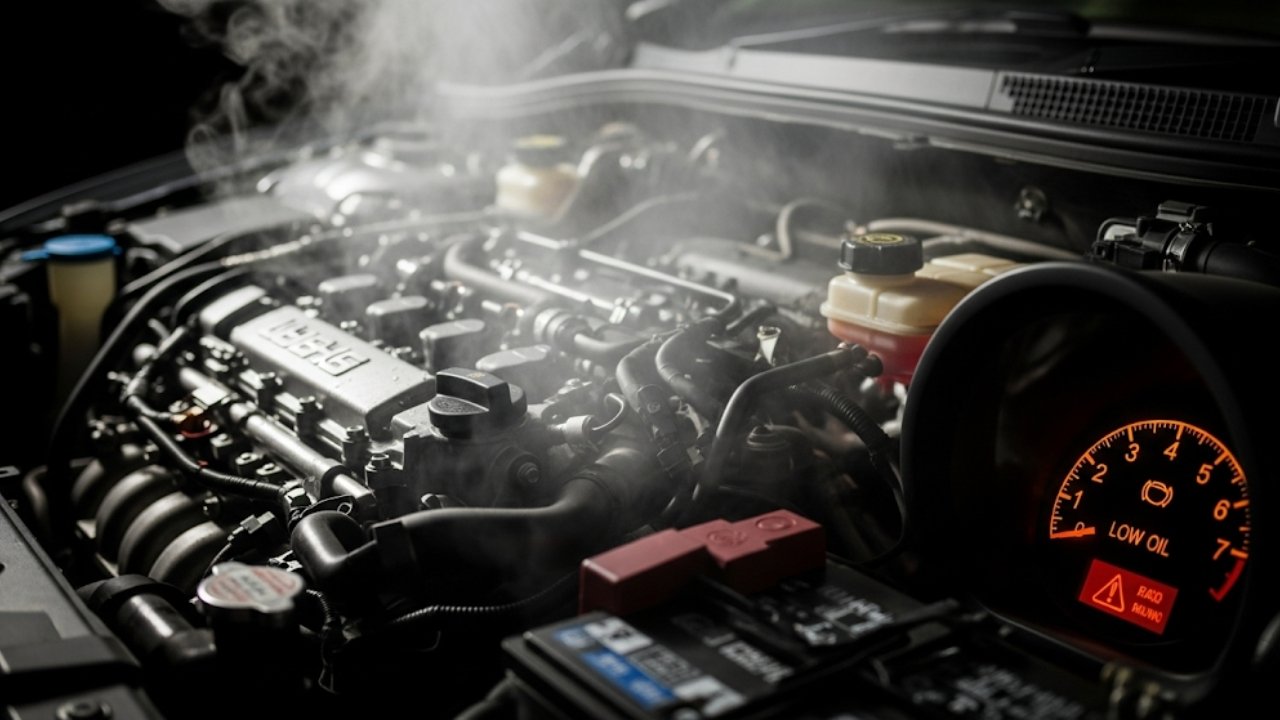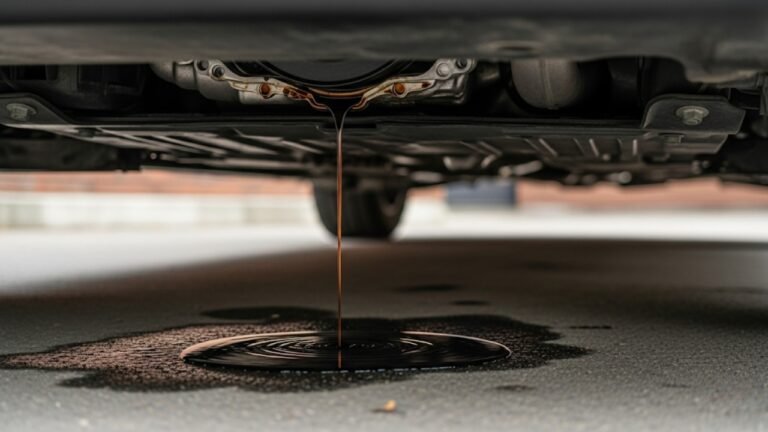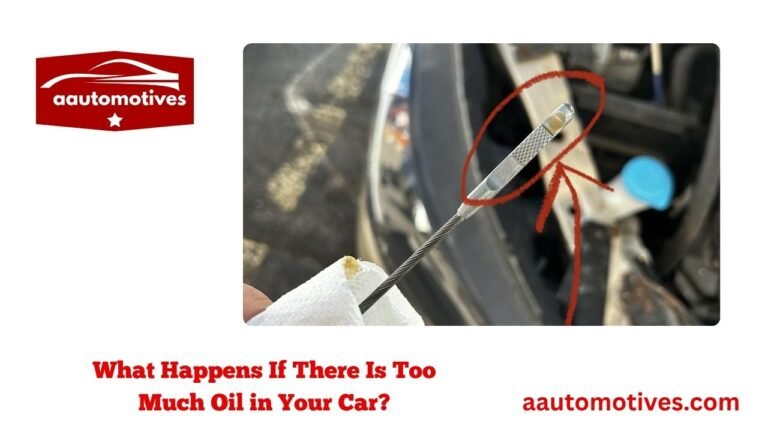Can No Oil Cause Your Car to Overheat?

Imagine you’re on a peaceful weekend road trip. The music’s playing, the road is empty, and your windows are down. Suddenly, your dashboard lights up—temperature gauge spiking, engine steaming, and your car groaning. You pull over, confused. You check the engine oil dipstick and… it’s dry. Bone dry.
So you start wondering: Can no oil cause your car to overheat?
The short answer is yes—absolutely. But let’s not stop at “yes.” Let’s break this down like a friend helping you figure out what just went wrong, why it happened, and how you can stop it from ever happening again.
This article dives into the relationship between engine oil and overheating, in simple terms. You’ll learn:
Why engine oil isn’t just lubrication
How oil and cooling systems work together
Signs you’re dangerously low on oil
Real stories from drivers who’ve learned the hard way
Practical tips to avoid overheating due to low oil
And yes, we’ll answer FAQs at the end too.
What Happens to a Car Engine With No Oil?

Think of your engine as your heart. Now imagine pumping blood without any… blood. Impossible, right?
Oil is the lifeblood of your engine. Without it, metal parts grind, heat builds up, and your car becomes a ticking time bomb. Unlike a cut that bleeds or a bone that cracks, your engine doesn’t give you a gentle warning. It seizes. Completely. Expensively.
Here’s what happens step-by-step when your engine runs with no oil:
Friction builds up between engine parts.
Metal starts wearing out instantly—called metal-to-metal contact.
Heat rapidly increases—overheating begins.
Engine components expand, warp, or even melt.
Complete engine failure can occur within minutes.
That’s right. It’s not hours. It’s minutes.
So yes, to answer again—can no oil cause your car to overheat? Absolutely. And it may ruin your engine beyond repair.
The Science: Why Lack of Oil Leads to Overheating
Many people wrongly assume that overheating only means radiator problems. But that’s only half the story.
Let’s look at the science behind oil and engine temperature:
| Component | Function Without Oil | What It Does With Oil |
|---|---|---|
| Pistons & Cylinders | Overheat and seize | Smooth, cool movement |
| Crankshaft & Bearings | High friction and wear | Lubricated and protected |
| Valves & Camshafts | Stuck or burnt | Freely moving and oiled |
| Cooling System | Overloaded and ineffective | Supported by oil cooling |
Engine oil doesn’t just lubricate—it absorbs and redistributes heat. When it’s gone, your cooling system gets overwhelmed. Radiator coolant can’t cool the engine alone. It’s like trying to stop a forest fire with a garden hose.
This is why no oil causes your car to overheat—the system can’t function as intended.
Real-Life Story: A Costly Mistake I’ll Never Forget
Let me share a true story.
My cousin Jamal had just bought his first used car. He was proud, excited, and eager to hit the road. But he skipped something critical—checking the oil. A week later, while driving in Dhaka heat, his engine began smoking. By the time he pulled over, the damage was done. The engine had seized.
The mechanic’s words were simple:
“There’s no oil. The engine is fried.”
The repair cost him more than the car was worth. That lesson stuck with me—and now, hopefully, with you.
How to Know If Your Car Has No Oil (Before It’s Too Late)
So how do you catch the problem before your car overheats? Here are some warning signs you should never ignore:
Burning smell from the engine
Loud knocking or grinding noises
Oil pressure warning light on dashboard
Unusual smoke from the tailpipe or hood
Engine stuttering or lagging
Temperature gauge rising abnormally
If you notice even one of these signs, stop driving immediately. Let the car cool. Check the oil. It could save you thousands.
How to Check and Maintain Engine Oil
Don’t worry—it’s easier than you think. You don’t need to be a mechanic.
Here’s a simple step-by-step guide:
Park your car on level ground and turn off the engine.
Let the engine cool down for 10 minutes.
Open the hood and find the oil dipstick (usually yellow or orange).
Pull it out, wipe it clean, and reinsert it fully.
Pull it out again and check the oil level.
If the oil is below the “Low” mark, top it off. But never overfill—too much oil can also cause issues.
Tip: Use the oil grade recommended in your car’s manual. Not all oils are created equal.
Common Reasons Why Oil Levels Drop Unexpectedly
Even if you’re careful, your car might lose oil. Here’s why:
Leaks in the engine or oil pan
Worn piston rings or valve seals
Burning oil due to internal damage
Delayed oil changes
Driving in extreme heat or over long distances
If your car regularly loses oil, have a mechanic check it. Frequent oil loss is often a sign of deeper engine trouble.
Preventive Tips: Never Let Your Engine Run Dry
Preventing engine damage from no oil isn’t rocket science. It just takes a little consistency.
Here are some practical habits that can help:
Check oil levels once a month. Use the dipstick. It’s a 2-minute task that can save your engine.
Get oil changes regularly. Follow your car manual’s schedule. Usually, every 5,000 to 10,000 kilometers.
Listen to your car. Unusual sounds or smells are warnings—not just quirks.
Keep extra oil in your trunk. Just like you keep a spare tire, keep a spare liter of oil.
Fix small leaks early. A tiny drip today can become a disaster tomorrow.
You don’t need fancy tools. Just attention and a bit of care.
Remember, car engines don’t die suddenly—they scream before they go. You just need to listen.
How Much Damage Can Overheating Cause?
Think of overheating as a fever in your car. A small temperature rise is manageable. But unchecked overheating? That’s dangerous.
Here’s what overheating due to no oil can damage:
| Component | Result of Overheating With No Oil |
|---|---|
| Engine block | May crack or warp |
| Pistons | Can melt or seize |
| Head gasket | Likely to blow (very costly) |
| Cylinder walls | Get scored, leading to compression loss |
| Camshaft/crankshaft | Can snap, bend, or wear permanently |
Once any of these fail, you’re looking at a rebuild or replacement. And that’s no small bill.
Average cost of engine replacement? $3,000 to $7,000 or more.
All for skipping a $10 bottle of oil.
Metaphorically Speaking: Oil is the Peacekeeper
Let’s go philosophical for a second.
Think of your engine as a kingdom. Every part—pistons, valves, crankshaft—is a player in a royal court. Without a peacekeeper (oil), chaos breaks out. Heat is the war. Friction is the rebellion. And before long, the entire kingdom collapses.
Oil doesn’t just lubricate—it keeps the peace.
So when you drive without oil, you’re pulling the peacekeeper from a place that thrives on balance. And imbalance leads to destruction.
How Long Can You Drive Without Oil Before Overheating?
This is one of those “dangerous curiosity” questions.
Technically? Maybe 5 to 10 minutes—if you’re lucky.
Realistically? Don’t even try.
Even idling for a short time with no oil can cause permanent damage. Driving under load—like on highways or in traffic—makes it worse.
So don’t play chicken with your engine. As soon as you suspect low or no oil, stop driving immediately. It’s not worth the risk.
FAQs: Quick Answers to What Everyone Asks
1. Can no oil cause your car to overheat even if the coolant is full?
Yes. Even with a full radiator, oil is critical to control friction and heat. Without it, the engine will still overheat.
2. What warning lights indicate low oil before overheating?
Look for the oil can icon, low oil pressure light, or sometimes a check engine light. Never ignore them.
3. Can I add oil to a hot engine?
Wait at least 10 minutes after shutting the engine off. Adding cold oil to a hot block can cause expansion cracks.
4. Is driving with low oil better than no oil?
It’s less bad—but still dangerous. Low oil means reduced lubrication and a high chance of overheating.
5. How often should I check my car’s oil?
At least once a month or before long drives. If your car is older or has leaks, check more often.
6. Can synthetic oil prevent overheating?
Synthetic oil withstands higher temperatures better, but it’s not a replacement for low oil. Keep it filled.
7. Can engine oil evaporate or disappear on its own?
Small losses happen over time, especially in older engines. But rapid loss = problem. Have it checked.
8. What’s the best oil to prevent overheating?
Always use the grade your manual recommends. High-mileage or synthetic oils usually perform better in heat.
Final Thoughts: Don’t Let Silence Cost You
You know, engines are quiet heroes. They don’t complain. They just go.
Until they don’t.
Running out of oil is like forcing a sprinter to run barefoot on broken glass. They’ll do it, bleeding and all—until they collapse.
So let me answer again:
Can no oil cause your car to overheat?
Yes, and it can destroy your engine in the process.
Now that you know, promise yourself this:
I will never ignore my oil again.
Your car—and your wallet—will thank you.






